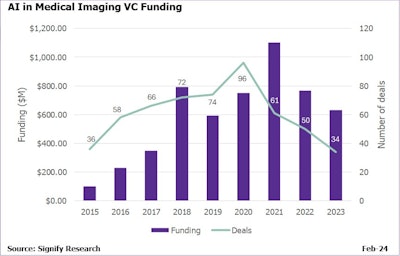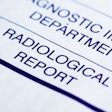Given ECR 2024's central theme, Next Generation Radiology, AI is bound to feature prominently at the congress. Research on AI topics will be everywhere, and it's extremely tough to find a scientific session without at least one AI-related talk. In the exhibit halls of Austria Center Vienna, industry leaders will emphasize the clinical potential of products and services designed to improve diagnostic accuracy and implement streamlined workflows.
AI scientific presentations aim to demonstrate continued progress in areas such as improving and accelerating image reconstruction, triaging critical cases, detecting findings initially missed by radiologists, and opportunistic screening for risk assessment and incidental disease detection.
For each major imaging modality, we've provided previews of selected AI-related scientific talks at this year's meeting. These are just a sample of the content on offer, and many other scientific presentations, posters, educational courses and exhibits, and plenary sessions on AI topics also await ECR attendees. For more information, check out the full meeting program.
CT
ECR 2024 delegates will get to learn about the role CT radiomics can play in clinical care, including helping clinicians determine the best treatment for patients suffering from non-small cell lung cancer. Other AI-related research to be presented will explore how chest CT muscle/body composition data can predict whether patients with pneumonia and known chronic obstructive pulmonary disease will require hospitalization. The spotlight will also fall on how body composition analysis can help in predicting the prognosis of individuals with idiopathic pulmonary fibrosis, and the use of deep learning-based algorithms for liver CT.
Below is our selection of research-based sessions to consider:
- Quantitative analysis of chest CT findings. RPS 804: 29 February, 9:30-11:00 CET, ACV - Research Stage 4.
- Recent development in AI for lung nodule detection. RPS 1205: 1 March, 8:00-9:00 CET. ACV Research Stage 2.
- From diagnosis to prognosis: chest imaging. RPS 1404: 1 March, 12:30-13:30 CET. ACV Research Stage 4.
- Latest CT technology in oncologic imaging. RPS 1416: 1 March, 12:30-13:30 CET. ACV Research Stage 2.
- AI in abdominal imaging: current directions. RPS 2401: 3 March, 11:30-12:30 CET. ACV Research Stage 3.
Digital x-ray
Is there still a role for x-ray imaging in the next decade? This question will be addressed at ECR 2024, with presentations suggesting that innovative AI approaches promise to shape a new future for the modality. In one session, for instance, researchers will suggest that AI and x-ray may be integrated in a "perfect wedding," with major benefits for radiologists and the diagnostic workflow. Another session will explore the feasibility, testing, and planning of chest x-ray AI algorithms in cancer screening services. Also, at least one presentation will include details on how currently approved stand-alone chest x-ray products compare to each other, benchmarked against human readers.
Check out these selected sessions:
- Chest x-ray: will it stay or will it go? SF 2b: 28 February, 9:30-11:00 CET, Room C.
- X-ray: still alive? E³ 819: 29 February, 9:30-11:00 CET, Room D2.
- Harnessing AI for enhanced reporting and workflow. RPS 1005: 29 February, 14:00-15:30 CET, ACV Research Stage 1.
- Recent development in AI for lung nodule detection. RPS 1205: 1 March, 8:00-9:00 CET, ACV Research Stage 2.
- Validity of explainable AI and model trustworthiness. SF 15b: 1 March, 14:00-15:30 CET, Room G2.
Molecular imaging
Developments in the field of imaging-guided theranostics stand out as a major topic at ECR 2024, with presentations organized to cover specific applications in prostate cancer and neuroendocrine tumors. In addition, at least one session will discuss new PET radiotracers available for these applications, specifically PSMA-, FAPI-, and SSR-PET tracers.
Molecular imaging has emerged as a key technique in supporting etiologic diagnoses of dementia, with practical insights to be offered in another session on appropriate patient selection and the diagnostic workup of these patients. Also, is total-body PET ready for the limelight? In another session we've highlighted, researchers will discuss technical aspects and clinical applications of the technology, with the session culminating in a panel discussion that poses this question: "Total-body PET: Why (not) everyone should get one?"
See below for our molecular imaging selections:
- Imaging-guided theranostics: current clinical practice and recent developments. RC 406: 28 February, 13:00-14:00 CET, Room K1.
- Dementia: towards an aetiologic diagnosis. TC 927: 29 February, 12:30-13:30 CET, Room B.
- Advances in hybrid, molecular and translational imaging. RPS 1106: 29 February, 16:00-17:30 CET, ACV - Research Stage 1.
- Total-body PET: technical aspects and clinical applications. SF 10: 29 February, 14:00-15:30 CET, ACV - Room C.
- Non-FDG PET tracers in oncologic imaging. RC 1806: 2 March, 9:30 -10:30 CET, Room K1.
MRI
Among the MRI themes to be addressed at ECR is the use of AI with the modality. The diagnostic performance of AI systems at detecting clinically significant prostate cancer in MRI will receive particular attention. The use of AI, PI-RADS, and clinical data to reduce false positives in prostate MRI, along with the impact of AI on the diagnosis of prostate cancer with multiparametric MRI by novice radiologists and the use of AI for characterization and diagnosis of focal liver lesions. Neuroimaging will be another recurring topic, including the clinical application of AI in cases of multiple sclerosis and multiple myeloma.
These research-based sessions caught our eye:
- Impact of AI on diagnosis of prostate cancer. RPS 605: 28 February, 16:30-17:30 CET, ACV - Research Stage 4.
- Radiomics applications in MRI. RPS 705: 29 February, 8:00-9:00 CET, ACV - Research Stage 1.
- Novel AI models redefining radiology diagnostics. RPS 1105: 29 February, 16:00-17:30 CET ACV - Research Stage 2.
- Neuroimaging in white matter disease. RPS 1411: 1 March, 12:30-13:30 CET, ACV - Research Stage 1.
- Recent AI advancements in MRI for precision imaging. RPS 2005: 2 March, 14:00-15:30 CET, ACV - Research Stage 1.
Women's imaging
There will be a plethora of ECR presentations on the optimum use of AI for breast imaging applications. New study findings revealed in scientific and educational sessions plus industry demonstrations look set to illustrate the technology's continued progress in diagnosing and predicting risk for breast cancer. This includes how AI can assess breast arterial calcifications, how multimodal AI can improve breast cancer screening, how the technology can help tackle the challenge of interval cancers, and how adding prior imaging exams to AI can further enhance the technology's performance, among other innovative applications. The use of AI in gynecological cancer imaging will also feature.
Below is our selection of talks and sessions:
- The performance of a commercial AI algorithm in an external quality assurance scheme regularly used by humans in the NHS breast screening programme. RPS 505: 28 February, 15:00-16:00 CET, ACV - Research Stage 2.
- AI in breast imaging. RPS 1202: 1 March, 8:00-9:00 CET, ACV - Research Stage 1.
- Functional breast imaging modalities. RPS 1602: 1 March, 16:00-17:30 CET, ACV - Research Stage 2.
- Abbreviated breast magnetic resonance imaging (MRI) protocols in a very high-risk population: friend or foe? RPS 1802: 2 March, 9:30 - 11:00 CET, ACV - Research Stage 2.
- Pitfall and mimickers in gynaecological cancer imaging. E³ 2021: 2 March, 14:00-15:30 CET, ACV - Room E1.
AI technology trends at ECR 2024
By Ellie Baker, Signify Research
At this year's congress, there will be a greater focus on how vendors in the AI market can expand beyond their image analysis capabilities to have an impact on additional aspects of the radiology service line. Image acquisition, reporting, and personalized treatment planning are areas expected to receive the most traction at the congress.
Ultimately, combining both operational AI capabilities and image analysis AI will enable providers to enhance diagnostic accuracy and streamline workflows in practice, the vendors claim. This is exemplified in new offerings such as b-rayZ's DANAI solution, positioned as a novel custom AI framework for breast screening, as well as DeepHealth's OS product, which provides clinical and operational workflows for medical imaging.
According to the companies, combining image analysis with wider service-line functions will help tackle the most pressing issues in radiology: shortages of radiologists, staff burnout, and a requirement to improve patient outcomes. However, for most AI-independent software vendors, the capacity to target additional aspects of the radiology service line is limited, and the operational AI segment is getting rapidly more competitive with the emergence of "Generative AI." Therefore, the money and resources required to expand beyond image analysis may be better spent doubling down on proving return on investment for imaging analysis tools through robust health-economic studies or expanding their current offering to more comprehensive solutions.
The presence of AI vendors at ECR 2024 is expected to be strong, as usual, though perhaps a bit more muted. The investment landscape has changed drastically in the medical imaging AI market over the past few years. The number of venture capital (VC) deals has decreased significantly since its peak in 2020. Investors now require a clear path to breaking even and prefer vendors who can demonstrate revenues and strong clinical and health economic evidence.

With that in mind, and as funding runways for the vendors with small investments shorten, there may be excitement around the possibility of additional acquisitions. In the past three months alone, 4DMedical acquired ImBio, Lunit acquired Volpara, and, most recently, European platform consolidation was exhibited with deepc acquiring Osimis. Discussion will focus on which clinical application will next witness consolidation and therefore fewer vendors competing in that market. However, with the highly competitive AI market still rife with vendors and funding tighter, some vendors are likely to face a more unfortunate fate.
Overall, ECR presents a great opportunity for vendors to explore additional partnerships and, in line with increasing market maturity, capitalize on the growing trust and increasing adoption of AI in imaging workflows. However, behind the glossy booths, the undercurrents of change are growing stronger – and for some firms, this may even be their last ECR.





